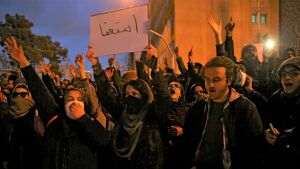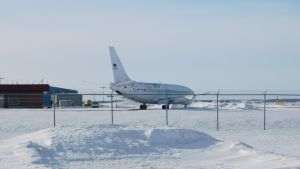• The authorities in Astana have made the following proposal to president Băsescu: Romania would reschedule the payment of Rompetrol"s debt by another five years, in exchange for Kazakhstan giving us facilities for the exploitation of uranium
• It is precisely five years from now that the new units from the Cernavodă nuclear plant are supposed to come online, fueled by Kazakh uranium
• For now, negotiations are under way, with the final deadline being set for September
The Romanian delegation, led by president Traian Băsescu, was received in March, in Astana, by the local government with a new proposal: the extinguishment of the debt of the Rompetrol group - controlled by the Kazakh state.
The proposal laid on the table by the Kazakh officials is a simple one, government sources say: the over 600 million dollars that Rompetrol needs to pay by September, for the bonds issued seven years, would be rescheduled over a period of up to five years. The end of this period would overlap with the moment when Romania is supposed to commission the two new nuclear reactors of Cernavodă, which would be fueled by the uranium extracted from Kazakhstan.
The Romanian authorities did not turn down the facility requested by the Kazakhs, due to the compensation that came attached to this proposal: in return for the rescheduling, Romania would receive facilities in the exploitation of uranium deposits on the Kazakh territory. Moreover, the two parties have agreed on the creation of a joint-venture that would export uranium and heavy water from Kazakhstan.
The Romanian partner in the joint venture would be the National Uranium Company, controlled by the Romanian state.
The information we obtained from government sources has not yet been officially confirmed, because both sides have agreed to postpone the official announcement concerning the procedure for extinguishing the debt of Rompetrol, until the negotiations are complete.
In Astana, the Romanian delegation signed a memorandum with the Kazakhs, under which the Romanian National Uranium Company will receive a concession for exploiting a uranium mine. The Kazakh plan in fact involves certain facilities for the exploitation of the mine, and in exchange Romania would offer facilities for the repayment of the debt of Rompetrol. Meaning the negotiations are not in the form of goods for cash, but rather an exchange of facilities between the two parties.
• The uranium mine
The new units in Cernavodă should be operation five years from now, but the Romanian state has not yet decided how big a stake it is going to keep in the nuclear plant.
The new units in Cernavodă will require uranium imports even if the domestic mines were to be revived.
The possibility of the Kazakh state attempting to reschedule the payment of the debt over as much as five years was announced by WBS Romania analyst, Florin Cătinaş, who said the following for BURSA: "It seems that the Romanian state and Rompetrol Rafinare have reached an agreement on the partial repayment of the bonds. 20% would probably be paid back this year, with the remaining 80% to be repaid over the next four-five years". Sources from inside Rompetrol claim that the Romanian state does not want to become a shareholder in the refinery again, but would instead prefer a medium-term solution for the exploitation of uranium.
The memorandum signed by the Romanian National Uranium Company (CNU) and the company of the state of Kazakhstan involves the exploitation of a sizeable concessioned uranium deposit. Meaning Romania would pay a royalty for the exploitation in question.
In order to exploit the uranium ore in Kazakhstan, the Romanian National Uranium Company would send in several experts from Feldioara. It is there, near Braşov, that Romania has the last facility for the extraction of uranium ore.
After the meeting with his Romanian peer, the president of Kazakhstan, Nursultan Nazabaev said that the Republic of Kazakhstan would welcome Romania"s projects to secure the uranium needed for its nuclear program. The mine in Kazakhstan could produce several hundred thousands of tons of nuclear fuel a year.
The Romanian specialists in the Feldioara unit were left without the object of their work, after the last active in Romania located at Crucea-Botuşana in the county of Suceava was closed down. The mine produced 40,000 tons of uranium ore a year, which generated 200 tons of uranium, the amount needed to ensure the production of electricity at the two active reactors of the Cernavodă plant. Even if the Romanian mine had been saved, the uranium produced domestically would not have been sufficient for the new units, 3 and 4, of Cernavodă, which are scheduled to be built by 2015. Before the agreement in Astana, the Romanian authorities considered importing uranium from Canada, South Africa or Australia.
The Republic of Kazakhstan is Romania"s most important trade partner in Central Asia. The commercial exchanges between the two countries amounted to almost 800 million dollars, in 2009, being affected by the global crisis, after nearing almost 2 billion dollars in 2008. Romanian capital is present in 35 companies operating in Kazakhstan.
























































